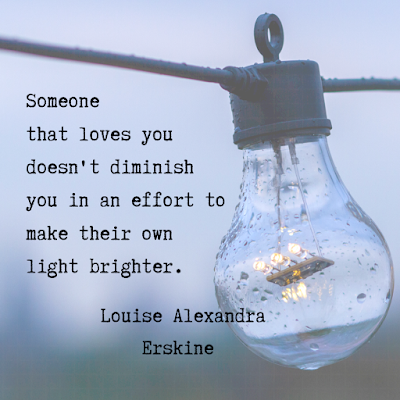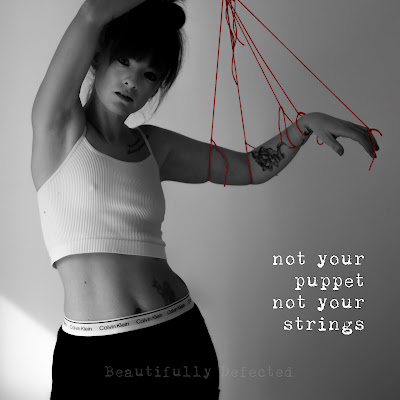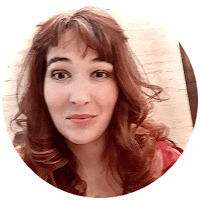By Rosie MacLeod
Imagine if you could explore and confront your most traumatic experiences in a way that would help not only you but also your readers to heal?
This is precisely what Louise Alexandra Erskine has turned her hand to. Poetry helped her “unintentionally” to face—and progress beyond—the “compound trauma of childhood trauma, failed marriage [and] an abusive marriage.” One of her micropoems went viral, accumulating 50,000 repins on Pinterest. Fans have even been tattooed with its words:
Andfrom theChaosof Her soulthereflowedBeauty
This year, she released her second poetry collection, Screw Prince Charming!, also home to many micropoems. Why micropoems? “The format is a tool that’s more accessible,” Louise muses, “it’s a really good way to pick apart your own hopes, dreams, disappointments, trauma and memories and make them digestible.”
Vulnerability, micropoems, and building your brand gradually—Louise Alexandra Erskine shares how to build your “personal brand of books” and resonate with readers in self-care poetry.
***
WOW: Thanks for joining us today. Your new collection, Screw Prince Charming! is very readable. Talk to me about your work, and how you got started.
Louise: It has all just grown up with me. It’s just me exploring what it is to be a woman, to be me, to have trauma, to heal. All these little parts of me, entwined. We—me and poetry—are growing up together, and we are not there yet. That’s why I haven’t written my experiences as a memoir yet. It’s a process that it is still working itself out publicly—not just healing, being brave enough to dream publicly. I think that’s the hardest part, sometimes.
WOW: So you and poetry are still growing, and in an interview, you said it had evolved into something larger. What is that something?
Louise: I never really set out to be a brand, but it’s evolving that way. I almost feel like it’s more of a movement than anything, this movement of people who have grown in that constant battle between feeling broken and searching for wholeness and meaning in all of the trauma. We are not lightness, and we aren’t darkness. Me and people like me are the light between the stars.
WOW: For readers searching that wholeness, your poetry books feature spaces for writing exercises geared towards self-care. What made you want to build this service-orientated brand around your books?
Louise: When I was 26, journaling was huge. I was divorcing. To have kept a diary or a journal would have been incredibly unsafe for me. A poem, on the other hand, if somebody found it, could just be a poem. So poetry enabled me to pin down on paper and gain perspective. I would feel less weighed down by ‘the things’ if I could just look at them in front of me, rather than feeling trapped beneath them. I just felt, if that works for me, there will be others whom journaling is overwhelming or unsafe.
WOW: Gosh, that’s a danger I’d never even thought could exist. What came first for you—the poetry or the therapy? Were you writing poetry when you found it to be a great healer, or recovering when you discovered poetry really helped?
Louise: I was healing and writing poetry, but I didn’t realize I was doing the two things simultaneously; it was just a natural process for me.
WOW: And was the self-care angle also a natural one to pursue? Did you see the therapeutic benefits of writing, and just need to get the word out there? Or was it something else?
Louise: It was just something I enjoyed. I realized then I would feel lighter because of it. It helped me to feel less alone. When I put my poems out there and they generate reaction; I know I am reducing peoples’ loneliness. And if my work could do that, that was everything to me. It was all about the connection. I did not want anyone else to feel as painfully isolated as I had.
WOW: As well as relieving loneliness, you inspire other people to write. There are spaces for writing exercises in your books and journals. Why do you inspire other people to write?
Louise: We rise by lifting others. If you push a rock up a hill, you’re still going to summit! I want to be the best teacher or mentor. To be a leader, you must want to take people where you’ve been and equip them to go further. That is the joy of leadership.
WOW: And by leading them into creativity, your readers become writers. The receiver of the creativity becomes a creator. Are you deliberately pushing boundaries and asking, “What even is poetry?” and “What even is a poet?”
Louise: Yes, I absolutely am. I don’t just write poetry, I am poetry. There’s a Bible verse that talks about how we are God’s masterpiece—“masterpiece” is the Greek word for “poem,” pōema (also spelt “pōlema”), from where we get “poem”: you are a poem that God wrote. That’s me. I am literally walking poetry. No, you don’t have to write things in nifty little squares to be a poet. You literally are poetry. To be a poet is about pushing boundaries. If you can do it in poetry, you can push them elsewhere. You can challenge societal norms to improve the world. I know that sounds incredibly idealistic, but I am and I’m not sorry!
WOW: In pushing boundaries, you seem to define poetry as “An ongoing conversation—an energy—shared with my readers.” All your readers and followers are writing a chapter in your work. Am I right?
Louise: Yes. I love that so much. It is not about me or my writing or my personal glory, it is about creating a movement of people that can heal and evolve and challenge enough to change the world. That is my aim.
"We all have a distinctive backstory. It's a case of being able to be vulnerable enough to share it."
WOW: What tips do you have for building that movement and a brand around books? Is it a distinctive backstory? A landmark quote? Some other Unique Selling Point?
Louise: I wish I knew! I am figuring this out as I go. I think it’s all of the above. We all have a distinctive backstory. It's a case of being able to be vulnerable enough to share it. You are your brand, and you must find your people. A distinctive backstory could be absolutely anything. Whatever your story, your people will be out there, people who identify with you and share part of your story. You need to be brave enough to be vulnerable with them, and honest enough to show your genuine self. That is scary, especially at the start. A wide audience would be lovely, but my focus is on finding the right audience: meeting the readers my heart is for and then bringing them alongside me in the best possible way. A wide audience will help you to find more of the right audience. I keep trusting that focusing on the right audience will cause the rest to fall into place. It’s a balance. Maybe that is the unique selling point—nobody else can tell my story.
WOW: Do you find that very contemporary language helps to tell that unique story? I’ve noticed that the language in your poems is very colloquial.
Louise: It depends on the audience you’re trying to attract. If you want to connect with academics and intellectuals, then use all of the beautiful poetic language. But if you’re looking to connect with people who are broken and searching for a way to heal, then you need to speak to them and meet them where they are. I am not afraid to drop an F-bomb in a poem because that will connect with my target audience (trauma survivors). It’s mostly about knowing whom you want to connect with so you can know which language is best for you to use.
WOW: So that’s the advice for speaking to a readership—what about for writing in a positive and therapeutic way? Any advice on that?
Louise: Even when it’s something that hurts, you can still make it beautiful with poetry. I wrote a poem about a miscarriage I had. There was nothing in it to say it was about a miscarriage. It said, “And just like that you were gone, and I’m left here without you. Like a sky stripped of all its stars.” It helped me to put metaphor to something. It makes it simultaneously bigger and smaller. I feel like it’s okay now. I will never be a woman who hasn’t miscarried multiple times, but I can now hold that information without it breaking me because I processed it, wrote it in this way, and because I’ve made it into something that’s beautiful. I shared it and people have connected with the sense of loss and that is an incredibly powerful thing.
WOW: You’ve also processed painful domestic abuse in poetry, as well as how you are overcoming it. Do you have any advice for writing about really traumatic issues?
Louise: Think about a moment that hurt. You can just take a small segment from it, without naming the whole, specific trauma. Just capture the essence of it. Write maybe ten micropoems about the same/similar moments. You will slowly build a picture of something that happened as well as how you are processing and healing from it. Don’t ever share it while it’s still raw. You need to write it, put it away and come back to it.
Don’t share it until you’ve finished processing it. The absolute last thing you want to do is write something traumatizing for you and attract invasive and overwhelming comments.
The first time you share it, tell it to your best friend. Tell them things you haven’t been brave enough to say out loud. And you don’t have to give a huge life story. Sharing a little bit of trauma at a time is the most effective way to heal.
WOW: When you are confronting trauma through those micropoems, when you’re building up a picture of what you’ve experienced, how do you keep writing positively?
Louise: Balance. Try to share a combination of my goal—meeting my people in their pain and isolation. I do this by letting my readers know I have felt what they feel. It would be incredibly heavy to only discuss those things. So I will also write poems that discuss the beautiful moments.
Much of the time, writers and speakers tend to sell themselves to an algorithm that works beautifully in terms of initial growth but that is detrimental long term. So, if I share something painful, complaining, and it does well, then the tendency is to say, “the algorithm likes this, so I’ll just keep sharing that content.” You then tunnel vision your way to only having this very one-sided, narrow perspective on content that you are sharing. And you must keep the bigger picture in mind. It is better to grow slowly. And then have a body of work that readers can look back through. Keep the wider picture, don’t niche too far as tempting as it can be.
"If I share something painful, complaining, and it does well, then the
tendency is to say, 'the algorithm likes this, so I’ll just keep sharing
that content.' You then tunnel vision your way to only having this very
one-sided, narrow perspective on content that you are sharing. And you
must keep the bigger picture in mind."
WOW: Are there any topics you would avoid, to keep that balance and keep writing in a positive way? Or is nothing off limits?
Louise: I think it very much depends on the circumstances. In a domestic abuse interview or blog post, I might discuss a specific incident of sexual trauma. I won’t put those things into poems. If I do an interview about domestic abuse, the people watching it have consented to that content. I don’t feel like anything is off-limits for me, but I will be the one to choose how and when and where those things are shared.
WOW: And yet, you’ve managed to do all this writing and interviews and raising awareness without using your name! Your entire brand is known as “Beautifully Defected.” Why did you take this as your “nom de plume”?
Louise: One of the many ways this idea of being “beautifully defected” came about was when I was in what might be called a “situationship” with a guy. He went to a rave and sent me a picture of him with a sticker reading “we are defected” stuck to his forehead. I didn’t know if it was thoughtless or if it was a comment on our relationship. Either way, yes, we are defected as a couple and as individuals—but I’ll be damned if I’ll be ashamed of that. I am defected, but it makes me beautiful. I can be more beautiful for having been broken. I was fashioned into something beautiful. Nobody gets to tell me that my brokenness is ugly.
WOW: Well put, and poetic as always, Louise! Thank you for chatting with me today.
Readers, find out more about Louise and her books by visiting beautifullydefected.com and catch up with her on Instagram @beautifully_defected.
***
Rosie MacLeod is a London-based translator, interpreter and reporter. She has made reports for Global Radio and regularly reports for ShoutOut UK and East London Radio. She has written for Drunk Monkeys, World Literature Today, Inside Over and the Journal of Austrian Studies. You can listen to her radio work here: www.mixcloud.com/rosie-macleod. She tweets as @RosieMacLeod4. Get in touch via LinkedIn. Website: rosiemacleod.com. Instagram: @rosie.macleod.3










2 comments:
I know next to nothing about poetry but even though I've only read a few lines of your work throughout this interview they really resonate with me. I'm blown away at your ability to have 10 words that keep echoing in my head. Poets amaze me.
Thank you so much! 💜
Post a Comment